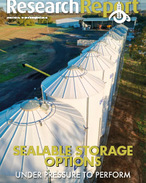This article is 3 years old. Images might not display.
Pleurisy is inflammation of the lining of the chest cavity and is seen at slaughter as translucent bands joining the lungs to the insides of the ribs.
Pleurisy typically occurs in conjunction with pneumonia, which makes sheep reasonably sick. Many sheep recover from pneumonia, so the residual pleurisy is seen at processing.
Outbreaks of pneumonia and pleurisy are caused by either environmental, animal and pathogen factors. These could include:
- Dusty conditions, hot weather and excessive crowding
- Inadequate nutrition, concurrent disease and stress. These all impact the animal's immune system making them more susceptible to pneumonia
- Pathogens include bacteria and viruses - primary pathogens like Mycoplasma ovipneumoniae initiates a mild pneumonia with no or mild signs, which can make the sheep more susceptible to a secondary bacterial infection which leads to severe disease
- Parasitic infection from lung worm can play a role
- Poor drenching technique can lead to aspiration pneumonia
Agriculture Victoria Veterinary officer, Hayden Marrow, said the severity of signs can vary greatly as some sheep will not show any respiratory signs except a reduction in weight gain, while others develop nasal discharge, coughing, laboured breathing, exhaustion and a lack of appetite before progressing to death.
"Clinical cases of pneumonia lead to increases in mortality, increased treatment costs and a reduction in animal welfare. However, reductions in weight gain from mild cases are also likely to be significant," Marrow said.
Agriculture Victoria advises producers to focus on prevention and manage risk factors, which include:
- Avoiding handling/transporting sheep in hot, dry conditions. Consider the impact of mixing purchased groups of lambs from different sources (stressful but also potentially exposes lambs to new pathogens)
- Ensuring nutrition and access to water is optimised and other major animal health issues such as intestinal worms are managed, and suitable shade is available
- Hosing down dusty yards and laneways before moving stock
- Do not lift head above horizontal when drenching and don't drench in a cradle
- New sheep could be carriers of respiratory pathogens that are new to your flock. Clinical cases of pneumonia can be treated with consultation from a private veterinarian.























